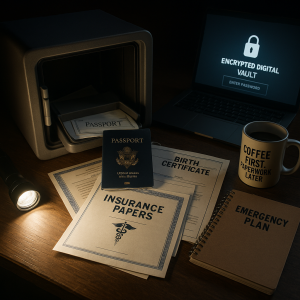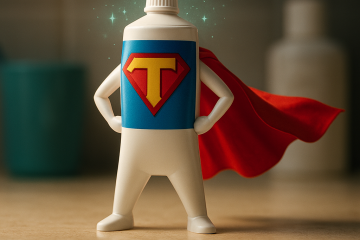
Always have backups to your backups–even when it comes to important documents.
Ah, the things we often forget when planning for “the big one”—the solar flare, the EMP, or that “zombie apocalypse” your friends joke about. But there’s one crucial prep that’s often overlooked amid the canned food and tactical gear: paperwork. You know, the stack of documents that make the rest of your prepping gear worth a damn.
Here’s the truth: in a world where a natural disaster, civil unrest, or even a simple home fire could hit at any time, having your important documents stored safely but easily accessible could be the difference between feeling like a lost child or a well-prepared adult. Trust me, when it all goes south, the last thing you’ll want to be doing is rifling through your house trying to find your insurance policy while everyone else is sipping water and roasting marshmallows.
Let’s break down the must-have documents you’ll want to have securely stored, organized, and ready to grab when life hits the fan.
1. Personal Identification and Family Documents
If things get hairy, you’ll need proof of who you are—and who your kids are (because, yes, your kids might be the ones you’re most worried about). Birth certificates, social security cards, and your passports (yes, even in the middle of the woods) should be front and center in your prepper documentation stash. It’s also a good idea to keep a copy of your marriage certificate and any legal documents related to guardianship, custody, or adoption.
2. Medical Records and Prescriptions
If your family depends on specific medications, you need to have those prescriptions (or even better, a few refills tucked away) ready to go. But even if you don’t have daily meds, everyone has medical records—your own, your spouse’s, your kids’, maybe even your pet’s. The basics: vaccination records, any allergies, and emergency contact information for your doctors. Trust me, when you’re 10 miles away from a hospital and someone starts having an asthma attack, you’ll wish you had these on hand.
3. Insurance Policies (Life, Home, Auto, Health)
In a disaster, the last thing you want is to remember that your car insurance is about to expire—or your home insurance only covers a fraction of what it should. Make sure your insurance policies are stored in a waterproof, fireproof safe or digital vault. You’ll want to have all the details—policy numbers, contact info, and especially the specifics on what’s covered—so you can act quickly if things go sideways.
4. Legal Documents: Wills, Powers of Attorney, and Trusts
Not the most exciting documents in the world, but trust me, they’re the ones you’ll be happy to have when the clock is ticking. A will, healthcare power of attorney, and durable power of attorney are absolutely necessary in case the worst happens. These papers may not be needed right away, but they’ll make life (and death) a lot easier for your loved ones should you be unable to make decisions for yourself. Don’t skip them—they’re just as critical as the gear you’ve stocked in your bug-out bag.
5. Financial Records and Bank Information
If the power’s out or the grid goes down, how will you access money? You’ll need a record of your banking information, credit card details, and even a list of any debt you owe—so you can manage payments and access money when the system is down. And let’s not forget your tax records—having your last few years’ worth of tax returns could save you a world of trouble when it comes to securing financial relief or verifying your status.
6. Property and Vehicle Titles
Imagine trying to prove ownership of your home or car after an event has turned your life upside down. Titles for property and vehicles are essential to ensure you have the right to claim them and potentially salvage them for future use. Keep these handy in a secure, fireproof box, ready to grab and go.
7. Backup Copies in Multiple Formats
Paper copies are important, but digital backups are just as crucial. Store copies of your important documents in encrypted cloud storage or on an external hard drive. That way, if something happens to your physical copies, you can still access them from anywhere with internet access. Just make sure your passwords are secure!
8. Emergency Contacts and Important Addresses
In the chaos of a disaster, communication will be key. Have a printed list of important contact numbers—family, friends, doctors, and emergency services—handy in case your phone isn’t accessible. Include addresses and routes to emergency shelters or meeting points, in case the tech fails and you can’t access your maps or contacts.
9. Deeds, Titles, and Ownership Documentation
Whether it’s your house, land, or even a boat, make sure deeds and titles to properties are secured. In times of crisis, being able to prove ownership can be essential for claiming resources or ensuring that others don’t attempt to seize your property.
10. Religious or Spiritual Documents
These might not be critical for everyone, but for some, religious or spiritual documents (such as baptism certificates, funeral plans, or prayer books) could provide comfort, guidance, or official recognition during a time of crisis.
Other Critical Documents to Keep On-Hand:
-
Emergency Plans & Evacuation Routes: A written plan with evacuation routes and meeting points in case you need to relocate.
-
Insurance Claims for Pre-Existing Damages: Past insurance claims and receipts for repairs or damaged items.
-
Pet Medical Records and Identification: For pets, including medical history and identification details.
-
Home Inventory List: A detailed list of your home’s contents (with receipts, photos, or appraisals) for insurance purposes.
-
Military Service Records: For veterans or active military personnel, these can be necessary for healthcare or benefits.
-
Digital Assets and Online Account Information: Details for online businesses, wallets, and accounts you may need to access quickly.
-
Special Needs or Disability Documentation: Medical information for anyone in your household with special needs, disabilities, or medical conditions.
How to Store It All: Secure and Accessible
Now that you know what documents you need, the question remains: where to store them? Your prepper stash of paperwork needs to be both secure and easily accessible. Consider a waterproof, fireproof safe for physical documents. For digital copies, use an encrypted USB drive or a password-protected cloud storage system that you can access when needed.
The trick is to find a balance between security and accessibility. You want your documents protected from natural disasters, fires, and prying eyes, but you also need to be able to grab them quickly when the time comes.


